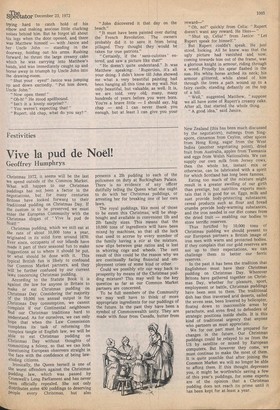Festivities
Vive la pud de Noel!
Geoffrey Humphrys
Christmas 1972, it seems will be the last we spend outside of the Common Market. What will happen to our Christmas Puddings has not ,been a factor in the negotiations, but for many centuries Britons have looked forward to their traditional pudding on Christmas Day. If the custom is to be preserved we must enter the European Community with the Christmas slogan of " Vive la pud de Noel! "
Christmas pudding, which we still eat at the rate of about 10,000 tons a year, originated in its solid form around 1670. Ever since, occupants of our islands have made it part of their seasonal fun to make suggestions as to where it should be put, Or what should be done with it. This typical British fun is likely to confound our Common Market partners, and they Will be further confused by our current laws concerning Christmas pudding.
According to the Statute Book it is against the law for anyone in Britain to make or eat Christmas pudding on Christmas Day. Considering the' majority of the 10,000 ton annual output is for ,Christmas Day cpnsumption, we cannot complain if our Continental neighbours find our Christmas traditions hard to understand. As for ourselves, we can only hope that when the Law Commission completes its task of reforming the Complex tangle of English law, we will be able to eat Christmas pudding on Christmas Day without thoughts of Committing a felony, so that we can look questioning European observers straight in the face with the confidence of being lawabiding citizens.
Ironically, the Queen herself is one of the worst offenders against the Christmas Pudding law, which was passed by Cromwell's Long Parliament and has never been officially repealed. She not only distributes some 400 puddings to deserving People every Christmas, but also presents a 2lb pudding to each of the policemen on duty at Buckingham Palace. There is no evidence of any officer dutifully telling the Queen what she ought to do with her Christmas puddings, or arresting her for breaking one of her own laws.
The royal puddings, like most of those to be eaten this Christmas, will be shopbought and available in convenient llb and 21b family sizes. This means that the 10,000 tons of ingredients will have been mixed by machines, so that all the luck that used to accrue by every member of the family having a stir at the mixture, now slips between gear ratios and is lost in whirring cogs and wheels. The nett result of this could be the reason why we are continually facing financial and employment crises of some kind or other.
Could we possibly stir our way back to prosperity by means of the Christmas pudding mixture? This may well be the key question as far as our Common Market partners are concerned.
To be full members of the Community we may well have to think of more appropriate ingredients for our puddings of the future. In the past they have been a symbol of Commonwealth unity. They are made with flour from Canada, butter from New Zealand (this has been much discussed by the negotiators), nutmegs from Singapore, cinnamon from Ceylon, other spices from Hong Kong, sugar from the West Indies (another negotiating point), dried fruit from Australia, apples from Tasmania and eggs from Welsh Nationalists. We can supply our own milk from Jersey cows, then the whole lot, instant mix or otherwise, can be lubricated with a spirit for which Scotland has long been famous.
Eating too much of the mixture might result in a greater swelling of our girth than prestige, but nutrition experts maintain that it is good for us. Eggs, milk and suet provide body-protecting substances; cereal products such as flour and bread crumbs provide body-warming substances, and the iron needed in our diet comes from the dried fruit — enabling our bodies to store terrific reserves.
Thus fortified by 10,000 tons of Christmas pudding we should present to our European partners a British image of iron men with warm and protected bodies. If they complain that our gold reserves are not up to their expectations, we can challenge them to better our ferric reserves.
In the past it has been the tradition that Englishmen must have their Christmas pudding on Christmas Day. Wherever Britons have gathered together on Christmas Day, whether for pleasure, sport, employment or battle, Christmas puddings have been sent to them. The traditional dish has thus traversed arid deserts, sailed the seven seas, been lowered by helicopter, floated down to inaccessible areas by parachute, and even fired to defenders of strategic positions inside shells. It is this kind of traditional urgencythat anyone who partners us must appreciate. We for our part must be prepared for changes in the future. Our Christmas puddings could be relayed to us from the US by satellite or mixed by European computers. But however they come, we must continue to make the most of them. It is quite possible that after joining the Common Market we will no longer be able to afford them. If this thought depresses you, it might be worthwhile saving a few of this year's puddings, for some experts are of the opinion that a Christmas pudding does not reach its prime until it has been kept for at least a year.










































 Previous page
Previous page